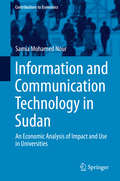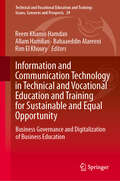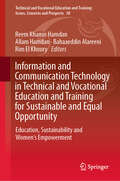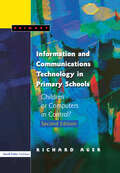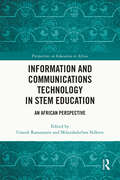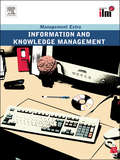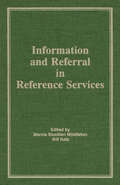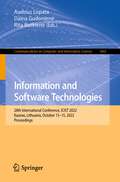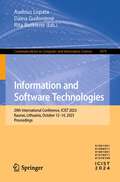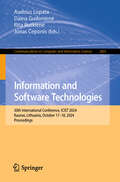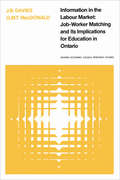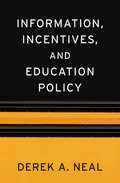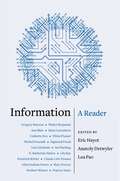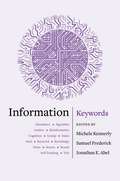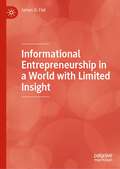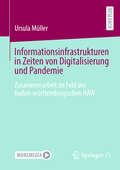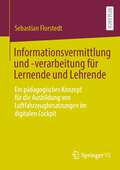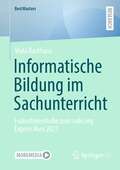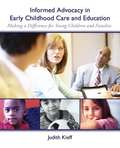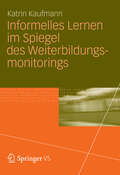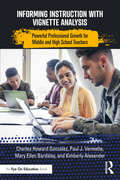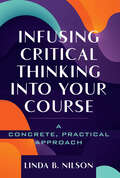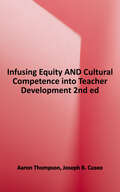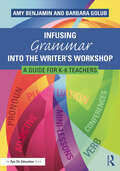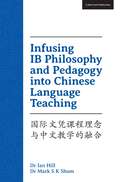- Table View
- List View
Information and Communication Technology in Sudan
by Samia Mohamed NourThis book discusses the use, economic importance and impact of Information and Communication Technologies (ICT) in public and private Sudanese universities. The author provides an in-depth analysis of the economic impact of ICT from the demand perspective as well as from the public-private perspective. This book also examines the status, pattern, structure, trend and determinants of the demand for ICT in public and private Sudanese universities. It investigates the economic impacts of the uses of ICT, the potential opportunities and challenges that ICT is expected to create for public and private Sudanese universities, and explains the role of ICT in facilitating the production, creation and transfer of knowledge in Sudanese universities.
Information and Communication Technology in Technical and Vocational Education and Training for Sustainable and Equal Opportunity: Business Governance and Digitalization of Business Education (Technical and Vocational Education and Training: Issues, Concerns and Prospects #39)
by Allam Hamdan Bahaaeddin Alareeni Reem Khamis Hamdan Rim El KhouryThis book provides an in-depth analysis of current development concerning ICTs with reference to vocational education and training. It presents the best and innovative ICT-based solutions implemented in education and explores controversial topics such as challenges and opportunities. Information and communication technologies (ICTs) have dramatically changed the way we learn and work. They have created new opportunities along with new challenges, putting profound and urgent implications on vocational education and training (VET). Nowadays, we must think broadly and make the right choices about VET using innovation and digitalization to boost the quality of vocational education and training, enable the upskilling and reskilling of adults, and enhance the employability of learners. The potential and the impact of ICTs in vocational education and training have yet to be fully exploited, leading to an emerging direction of research. This book helps readers to understand the idea of business education and education governance in a digital age. It is of interest to practitioners, administrators, researchers, teachers, teacher educators and students.
Information and Communication Technology in Technical and Vocational Education and Training for Sustainable and Equal Opportunity: Education, Sustainability and Women Empowerment (Technical and Vocational Education and Training: Issues, Concerns and Prospects #38)
by Allam Hamdan Bahaaeddin Alareeni Reem Khamis Hamdan Rim El KhouryThis book provide an in-depth analysis of current development concerning ICTs with reference to vocational education and training. It presents best and innovative ICT-based solutions implemented in education and explores controversial topics such as challenges and opportunities. It discusses the role of ICT, vocational education and training in women empowerment. It also examines digital learning, vocational education and sustainable operations. Information and communication technologies have created new opportunities along with new challenges, putting profound and urgent implications on vocational education and training (VET). Nowadays, we must think broadly and make the right choices about VET using innovation and digitalization to boost the quality of vocational education and training, enable the upskilling and reskilling of adults, and enhance the employability of learners. The potential and the impact of ICTs in vocational educationand training have yet to be fully exploited, leading to an emerging direction of research. This book helps readers to understand the idea of business education and education governance in a digital age. It is of interest to practitioners, administrators, researchers, teachers, teacher educators and students.
Information and Communications Technology in Primary Schools, Second Edition: Children or Computers in Control?
by Richard AgerThis new edition takes into account advances in software and technology such as interactive whiteboards and digital cameras, focusing upon how these new resources can be most effectively used to enhance teaching and learning in the classroom. Providing the fundamental background information to put ICT develpoments into a classroom context, the book looks at at what can be learned from the latest national research into ICT use in the classroom and provides a wide range of classroom activities. The book should be of particular interest to undergraduate and postgraduates Primary education students, INSET participants, ICT coordinators and senior managers.
Information and Communications Technology in STEM Education: An African Perspective (Perspectives on Education in Africa)
by Umesh Ramnarain Mdutshekelwa NdlovuThis timely book presents the latest scholarly research on the integration of Information Communications Technology (ICT) for enhanced STEM education in African schools and universities. Featuring critical discussion and illustration of key data-led arguments, this volume gives a comprehensive picture of the breadth, complexity, and diversity of issues present in different African countries. It highlights a diverse range of topics such as approaches to ICT integration, the use of digital technologies to support inquiry-based learning, teacher development, and contextual issues in ICT integration for STEM education. Chapters feature contributions and shared experiences from prominent science educators and researchers from across African regions, and demonstrate findings and reflections on emerging trends, pedagogical innovations, and research-informed practices on ICT integration in STEM education. Offering cutting-edge research on STEM and digital education in Africa, the book will appeal to researchers, postgraduate students, and scholars in the fields of STEM education, ICT education, digital education, and pedagogy.
Information and Knowledge Management Revised Edition: Revised Edition (Management Extra Ser.)
by ElearnStuck for ideas, inspiration or just want to work differently? Management Extra brings all the best management thinking together in one package. The books are practical and well structured to provide an in depth treatment of these management topics. Titles in the series: * Business Environment * Change Management * Development for High Performance * Effective Communications * Financial Management * Information and Knowledge Management * Leadership and Management in Organisations * Leading Teams * Making Sense of Data and Information * Managing Markets and Customers * Managing for Results * Managing Health, Safety and Working Environment * Managing Legal and Ethical Principles * Managing Yourself * Positive Working Relationships * Project Management * Quality and Operations Management * Reaching Your Goals Through Innovation * Recruitment and Selection * Reputation Management The series fuses key theories and concepts with applied activities to help managers examine how they work in practice. The books are created with individuals in mind. They are designed to help you improve your management skills. Management Extra can also be used in conjunction with management programmes of study aligned to standards. Each of the books has case studies, self assessments and activities all underpinned by knowledge and understanding of the frameworks and techniques required to improve performance. Management Extra provides managers and trainers with a handbook for action and development. "You found it – what a find! A practical resource packed with all the relevant theory and suggested activities to support your professional development. An essential resource to have at your fingertips, jump in and enjoy."--Russell Jeans, Learning and Development Manager, ntl "All the essential concepts are here, presented in an easily digestible format with lots of up to date case studies and references – but, most importantly, with plenty of thought provoking activities and self-diagnostic exercises to make the learning personal and transferable."--Peter Manning, Head of Training & Development, News International Newspapers Ltd
Information and Referral in Reference Services
by Linda S KatzThis book investigates a wide variety of situations and models which fall under the umbrella of information and referral. It examines traditional views in public libraries and library systems as well as descriptions of programs in nontraditional settings, such as academic libraries. A human services perspective is explored and research models are presented.
Information and Software Technologies: 28th International Conference, ICIST 2022, Kaunas, Lithuania, October 13–15, 2022, Proceedings (Communications in Computer and Information Science #1665)
by Audrius Lopata Rita Butkienė Daina GudonienėThis book constitutes the refereed proceedings of the 28th International Conference on Information and Software Technologies, ICIST 2022, held in Kaunas, Lithuania, in October 2022.The 23 full papers and 3 short papers presented were carefully reviewed and selected from 66 submissions. The papers discuss such topics as business intelligence for information and software systems, intelligent methods for data analysis and computer aided software engineering, information technology applications, smart e-learning technologies and applications, language technologies.
Information and Software Technologies: 29th International Conference, ICIST 2023, Kaunas, Lithuania, October 12–14, 2023, Proceedings (Communications in Computer and Information Science #1979)
by Audrius Lopata Rita Butkienė Daina GudonienėThis book constitutes the refereed proceedings of the 29th International Conference on Information and Software Technologies, ICIST 2023, held in Kaunas, Lithuania, in October 2023.The 27 full papers included in this volume were carefully reviewed and selected from 75 submissions. These proceedings contain a diverse array of research and insights in the field of Information Technology and related areas, such as: intelligent systems and software engineering advances, intelligent methods for data analysis and computer aided software engineering, language technologies and smart e-learning applications, AI-based it solutions.
Information and Software Technologies: 30th International Conference, ICIST 2024, Kaunas, Lithuania, October 17–18, 2024, Proceedings (Communications in Computer and Information Science #2401)
by Audrius Lopata Rita Butkienė Daina Gudonienė Jonas ČeponisThis book constitutes the refereed proceedings of the 30th International Conference on Information and Software Technologies, ICIST 2024, held in Kaunas, Lithuania, during October 17–18, 2024. The 25 full papers included in this book were carefully reviewed and selected from 75 submissions. They were organized in topical sections as follows: Intelligent Systems and Software Engineering Advance; Cyber Security; Intelligent Methods for Data Analysis and Computer-Aided Software Engineering; and Smart e-Learning Technologies and Applications.
Information in the Labour Market: Job-Worker Matching and Its Implications for Education in Ontario
by James Davies Glenn MacdonaldThis study uses a simple model of information gathering to generate policy recommendations concerning education in Ontario, especially at the post-secondary level. The schools are viewed as helping students discover jobs matched to their abilities, and policy prescriptions are offered from that standpoint. After examining earlier economic models of education – seeing it in terms of human capital and signalling – the authors analyse their informational model. In the light of the three theories of education, they then proceed to examine the appropriate role of government in the education market, and offer their policy recommendations. In addition, trends in the structure of education over the last two decades are studied and explained from the economic point of view. They argue that too much has been spent on formal education and not enough on on-the-job-training, but the answer is not more government intervention or vocationalism. Education policy should encourage free choice and an increasing ability to match interests or skills with jobs. Vocationalism merely hinders the latter and endangers economic well-being in the long term.
Information, Incentives, and Education Policy (The\sanford J. Grossman Lectures In Economics Ser.)
by Derek A. NealHow do we ensure that waste and inefficiency do not undermine the mission of publicly funded schools? Derek Neal writes that economists must analyze education policy in the same way they analyze other procurement problems. Insights from research on incentives and contracts in the private sector point to new approaches that could induce publicly funded educators to provide excellent education, even though taxpayers and parents cannot monitor what happens in the classroom. Information, Incentives, and Education Policy introduces readers to what economists know—and do not know—about the logjams created by misinformation and disincentives in education. Examining a range of policy agendas, from assessment-based accountability and centralized school assignments to charter schools and voucher systems, Neal demonstrates where these programs have been successful, where they have failed, and why. The details clearly matter: there is no quick-and-easy fix for education policy. By combining elements from various approaches, economists can help policy makers design optimal reforms. Information, Incentives, and Education Policy is organized to show readers how standard tools from economics research on information and incentives speak directly to some of the most crucial issues in education today. In addition to providing an overview of the pluses and minuses of particular programs, each chapter includes a series of exercises that allow students of economics to work through the mathematics for themselves or with an instructor’s assistance. For those who wish to master the models and tools that economists of education should use in their work, there is no better resource available.
Information: A Reader
by Hayot, Eric; Detwyler, Anatoly; Pao, LeaFor decades, we have been told we live in the “information age”—a time when disruptive technological advancement has reshaped the categories and social uses of knowledge and when quantitative assessment is increasingly privileged. Such methodologies and concepts of information are usually considered the provenance of the natural and social sciences, which present them as politically and philosophically neutral. Yet the humanities should and do play an important role in interpreting and critiquing the historical, cultural, and conceptual nature of information.This book is one of two companion volumes that explore theories and histories of information from a humanistic perspective. They consider information as a long-standing feature of social, cultural, and conceptual management, a matter of social practice, and a fundamental challenge for the humanities today.Information: A Reader provides an introduction to the concept of information in historical, literary, and cultural studies. It features excerpts from more than forty texts by theorists and critics—including Walter Benjamin, Umberto Eco, Lisa Gitelman, Ian Hacking, N. Katherine Hayles, Friedrich Kittler, and Norbert Wiener—who have helped establish the notion of the “information age” or expand upon it. The reader establishes a canonical framework for thinking about information in humanistic terms. Together with Information: Keywords, it sets forth a major humanistic vision of the concept of information.
Information: Keywords
by Michele Kennerly, Samuel Frederick and Jonathan E. AbelFor decades, we have been told we live in the “information age”—a time when disruptive technological advancement has reshaped the categories and social uses of knowledge and when quantitative assessment is increasingly privileged. Such methodologies and concepts of information are usually considered the provenance of the natural and social sciences, which present them as politically and philosophically neutral. Yet the humanities should and do play an important role in interpreting and critiquing the historical, cultural, and conceptual nature of information.This book is one of two companion volumes that explore theories and histories of information from a humanistic perspective. They consider information as a long-standing feature of social, cultural, and conceptual management, a matter of social practice, and a fundamental challenge for the humanities today. Bringing together essays by prominent critics, Information: Keywords highlights the humanistic nature of information practices and concepts by thinking through key terms. It describes and anticipates directions for how the humanities can contribute to our understanding of information from a range of theoretical, historical, and global perspectives. Together with Information: A Reader, it sets forth a major humanistic vision of the concept of information.
Informational Entrepreneurship in a World with Limited Insight
by James O. FietThis book organizes entrepreneurship theory in a way that constitutes a new body of knowledge, which is Informational Entrepreneurship. It can serve as a basis for teaching entrepreneurship and reducing performance uncertainty. Although entrepreneurship is not entirely about information, information determines how it can be systematically understood while depending less on luck. It also offers the only known, experimentally tested approach that incorporates decision support tools. Other known approaches rely on exposition for validation; whereas, Informational Entrepreneurship uses two-sample experiments that controlled for other explanations as well as experimenter bias. It will appeal to those studying and teaching entrepreneurship who are looking for a prescriptive approach, rather than a descriptive approach.
Informationsinfrastrukturen in Zeiten von Digitalisierung und Pandemie: Zusammenarbeit im Feld der baden-württembergischen HAW
by Ursula MüllerDieses Buch untersucht die Zusammenarbeit zwischen den Informationsinfrastruktureinheiten (IE) an Hochschulen für Angewandte Wissenschaften (HAW) in Baden-Württemberg im Kontext der Digitalisierung und der COVID-19-Pandemie. Anhand einer neo-institutionalistisch inspirierten, explorativen Studie mit einem vergleichenden Fallstudienansatz wird untersucht, wie sich die hochschulübergreifende und innerhochschulische Zusammenarbeit der IE seit der gesetzlichen Verpflichtung zu mehr Integration aus dem Jahr 2005 verändert haben. Die Ergebnisse zeigen, dass sich zwar (mit Ausnahme des Unterfeldes der HAW-Medienzentren bzw. E-Learning-Support-Einheiten) zumindest die Unterfelder der Hochschulrechenzentren und Hochschulbibliotheken stärker konstituiert haben, es aber nach wie vor Hindernisse für eine weitere Intensivierung und insbesondere für eine weitere unterfeldübergreifende Zusammenarbeit gab. Auch die tatsächlich beobachtete Integration im Inneren der Fallhochschulen blieb hinter den Erwartungen zurück und es zeigten sich keine „überlegenen“ institutionellen Lösungen. Somit scheint die gesetzliche Forderung nach mehr innerhochschulischer Integration (zumindest hinsichtlich formal integrierter Organisationsstrukturen) nur bedingt eine zielgerechte Umsetzung erfahren zu haben.
Informationsvermittlung und -verarbeitung für Lernende und Lehrende: Ein pädagogisches Konzept für die Ausbildung von Luftfahrzeugbesatzungen im digitalen Cockpit
by Sebastian FlorstedtMit der Einführung des digitalen Cockpits wurde der Arbeitsplatz für Luftfahrzeugbesatzungen im Bereich Mensch-Maschine-Interaktion neu erfunden. Moderne und zukünftige Luftfahrzeuge lassen sich nahezu problemlos steuern, verfügen jedoch über Schnittstellen, welche die Besatzung mit zuvor unbekannten Informationen versorgen. Menschen verlieren den Blick für das Wesentliche, nämlich die Wahrnehmung der relevanten Umweltfaktoren zum Schaffen eines Situationsbewusstseins. Dynamische und komplexe Situationen gilt es intuitiv zu erfassen, um zeitkritische Entscheidungen treffen zu können. Irrelevante Informationen müssen hingegen vernachlässigt werden, um die Auswahl einer Handlung nicht durch Analyseprozesse aufzuhalten. Das vorliegende Ausbildungskonzept wurde im Flugsimulator-Experiment mittels Teiltheorien validiert, welche sich insbesondere auf die Schaffung des mentalen Modells der Umwelt fokussieren. Die Anwendbarkeit des Konzeptes gilt für Tätigkeitsfelder, in denen eine langjährige Ausbildung unter verschieden Umweltsituationen, welche wenig Fehler verzeihen, nötig ist. Diese Arbeit dient einerseits als Lehrwerk und Nachschlagewerk in der Ausbildungsdurchführung und Interaktion zwischen Lehrenden und Lernenden. Andererseits dient das Konzept branchenübergreifend als ein strategisch-taktischer Leitfaden zum taktisch-operativen Ausbildungsdesign.
Informatische Bildung im Sachunterricht: Evaluationsstudie zum code.org Express Kurs 2021 (BestMasters)
by Viola BackhausIn diesem Buch geht es um Informatische Bildung im Sachunterricht. Darüber, dass das Lernen über und das Lernen mit digitalen Medien Teil der allgemeinen Bildung sein muss, besteht seit Anfang der 2010er Jahre weitestgehend ein Konsens in den politischen, gesellschaftlichen und bildungswissenschaftlichen Diskursen. Wie jedoch das Digitale in die Schule kommen kann, wird weiterhin diskutiert. Insbesondere zur informatischen Bildung in der Elementar- und Primarstufe ist noch vieles ungeklärt. Die Frage nach fundierten didaktischen Ansätzen zur informatischen Bildung in der Primarstufe ist daher besonders relevant für den Forschungsdiskurs des Sachunterrichts: Die Lebenswelt der Kinder, die zu ergründen der Sachunterricht zum Ziel hat, wird durch die Digitalisierung stark beeinflusst. Das primäre Anliegen der Autorin ist es, einen konkreten informatikbezogenen Lehrgang (code.org Express Kurs 2021) wissenschaftlich zu evaluieren und hinsichtlich seiner Praxistauglichkeit zu bewerten. Da zur Messung von informatischen Kompetenzen in der Primarstufe noch kein wissenschaftlich fundiertes Instrument verfügbar ist, wurde ein eigener Test entwickelt, der hier mit der Evaluationsstudie beschrieben und diskutiert wird.
Informed Advocacy in Early Childhood Care and Education: Making a Difference for Young Children and Families
by Judith E. Kieff<p>This practical guide describes the critical need for advocacy in the field of early care and extols the ethical responsibilities of all early child educators, as outlined in the Code of Ethical Conduct (NAEYC 2005). Organized into three parts, the text begins with advocacy in the field of early childhood education, discusses how to develop an advocacy agenda, and concludes with becoming an advocate for life. <p>Additionally, the author outlines six contexts for advocacy in the field of early childhood -- individual child and family, advocacy for the profession, program-based advocacy, private-sector advocacy, political activism, and advocacy in the global arena.
Informelles Lernen im Spiegel des Weiterbildungsmonitorings
by Katrin KaufmannTrotz der zunehmenden - vor allem bildungspolitisch geprägten - Bedeutungszuschreibung des informellen Lernens als relevante Form der Bildungsbeteiligung Erwachsener, liegen in und für Deutschland aktuell keine Längsschnitt- oder Trendanalysen zur tatsächlichen Beteiligung vor. Auf der Grundlage der Scientific-Use-Files der Querschnitterhebungen 1994-2007 des Berichtssystems Weiterbildung (BSW) wurden für diese Studie die Möglichkeiten und Grenzen trendanalytischer Betrachtungen des informellen berufsbezogenen Lernens untersucht. Fokussiert werden Funktionen und kontextuelle Einbindungen in Erwerbstätigkeit der informellen Lernaktivitäten. Im Ergebnis zeigt sich einerseits die Relevanz einer differenzierteren Betrachtung informellen Lernens Erwachsener und darüber hinaus werden die Möglichkeiten trendanalytischer Betrachtungen von Beteiligungsmustern unter sich ändernden Erhebungsformaten deutlich.
Informing Instruction with Vignette Analysis: Powerful Professional Growth for Middle and High School Teachers
by Paul J. Vermette Kimberly Alexander Mary Ellen Bardsley Charles Howard GonzalezDiscover how to improve classroom instruction with vignette analysis, an engaging and relevant form of professional development. The book features a wide variety of vignettes—from across 6–12 content areas such as English language arts, math, science, and social studies—designed to help teachers spot practices they like (or don’t like) and help them to connect the teaching practices described to well-established and research-supported frameworks. Each vignette is followed by an analysis of the lesson, which includes questions, prompts, and ideas of how to continue the conversation for pre- and in-service teachers as well as teacher educators on an individual basis, small groups, or as a class.
Infusing Critical Thinking Into Your Course: A Concrete, Practical Approach
by Linda B. NilsonCritical thinking—every scholar in the literature has defined it, but there is no clearly agreed upon definition. No wonder polls and surveys reveal that few college-level faculty can define critical thinking or know how to teach it. Still, critical thinking keeps appearing in accreditation standards and surveys of the skills employers seek in college graduates. The good news is that we do know that critical thinking can be taught. But the concept cries out for the simplification, translation into discipline-relevant course outcomes, tangible teaching strategies, and concrete assessment techniques that this book will provide.Like a course or a workshop, this book proposes learning outcomes for the reader—promises of what the reader will be able to do after reading it. These include:• explain what critical thinking is in simple terms;• convincingly explain to students why it is important for them to learn critical thinking, and, if they tune out, what they stand to lose;• overcome the challenges that teaching critical thinking presents;• identify the type of course content to which critical thinking can be applied and, therefore, that readers can use to teach critical thinking;• integrate critical thinking into the design of a new or existing course in any discipline;• write assessable critical thinking learning outcomes that are compatible with and make sense in any discipline;• select and adapt activities and assignments that will give students no- or low-stakes practice with feedback in critical thinking using a variety of questions, tasks, and teaching methods.
Infusing Equity and Cultural Competence into Teacher Development
by Aaron Thompson Joseph B. CuseoAs teachers face increasing diversity within their classrooms in learning styles, race, linguistics, and culture, the academic rigor needed to successfully enter college or a career will require them to evolve in order for all students to succeed. <p><p> Infusing Diversity & Cultural Competence into Teacher Education provides educators and future educators with pathways for achieving cultural competence. Placing this crucial competence in the teacher’s toolbox will increase their opportunity and the capacity of ensuring success in and out of the classroom. The tools presented in this book assist the teacher in making gains in closing achievement gaps, building opportunity for all students, building strong pedagogical skills, enhancing curriculum for their diverse students, and constantly assessing all of these areas to ensure they are maintaining their status as the largest contributor to students’ success. <p><p> Infusing Diversity & Cultural Competence into Teacher Education: <p> Defines, describes, and explains why diversity should be part of the formal education process <p>Illustrates student, family, school, and community roles in the learning process. <p>Describes how to incorporate intercultural communication and relationship building skills into curriculum.
Infusing Grammar Into the Writer's Workshop: A Guide for K-6 Teachers
by Amy Benjamin Barbara GolubHelp your students improve their language skills and become stronger readers and writers. In this timely book, literacy experts Amy Benjamin and Barbara Golub offer best practices for fortifying the writer’s workshop model with meaningful, relevant instruction in grammar. The book answers questions such as… What does a writer’s workshop look like and how does it fit into balanced literacy models? How does grammar fit into a writer’s workshop? How can you use natural language acquisition to transition children from non-Standard to Standard English patterns? How can you teach students to identify a complete sentence? What are effective ways to teach parts of speech? How can you build on nouns and verbs to teach adjectives, adverbs, prepositional phrases, and dependent clauses? In each chapter, you’ll find out exactly what teaching the targeted concept looks like in a workshop classroom. Examples are provided for different grade levels and can be adapted as necessary to meet your needs. This book is a No-Worksheet Zone. You’ll learnhow to present grammar using authentic text and talk, leading to more durable learning.
Infusing IB Philosophy and Pedagogy into Chinese Language Teaching
by Mark S. ShumThis book not only examines what IB philosophy is, it also explores the relationship between IB philosophy and Chinese language and culture and introduces a lot of useful and creative teaching pedagogies and methodologies. Most importantly, this book fills the gap of implementing IB philosophy and pedagogy into Chinese language teaching.
